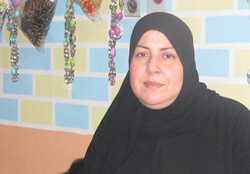Gaza Strip 25 May 2010

Naima Akkawi and Mahmoud Jouda’s children Rimas and Riwan.
Naima Akkawi, a 40-year-old Moroccan native, is finally back home in Gaza with her husband Mahmoud Jouda and her two young children, Riwan (5) and Rimas (3) after an enforced absence of 10 years.
During that long and agonizing separation, Mahmoud and Naima did all they could to get back together through official channels but it was all to no avail. Finally, Naima, who had been living mostly in Morocco with Riwan and Rimas, decided to take the risk of going through a tunnel in order to be reunited with her loved ones.
“Since 2000, I have not been able to visit the Gaza Strip,” Naima explained, “a period in which I have endured every possible bad feeling being away from my dear husband.” Until 2007, she says during an interview at her newly established cosmetics shop in the Maghazi refugee camp in central Gaza, when Israel tightened its siege on Gaza, the couple were able to meet in Morocco or in Cairo.
Naima has been with her family in Gaza for almost six months, but it took a year of thought and hesitation to take the risky decision to go underground into one of the many tunnels that have become Gaza’s main lifeline to Egypt and the world beyond.
Since June 2007, Israel enforced a total closure of all of Gaza’s border crossings and Egypt sealed off the only gate into its territory, opening it only rarely for any of Gaza’s 1.5 million residents. The blockade has led to the excavation of numerous tunnels along the Gaza-Egypt border line. Gazans use such tunnels to bring in essential goods and commodities such as foods, cement, electronics and thousands of other items.
Recalling conversations with her husband, Naima said “He used to try to convince me to come across the border through a tunnel. I used to have a mix of feelings — I was worried about the risk but also so anxious to reunite with Mahmoud. Eventually I opted to take the risk.”
Back in the Moroccan city of Meknes where Naima lived before she moved to Gaza, she and many other neighbors and friends worried about family members who had married into families in Gaza.
“Actually, the Moroccan people are extremely sympathetic to the Palestinian people,” Naima said. “Many times I used heard people talking about going to Palestine to show solidarity or take any action for the sake of those suffering under Israeli attacks and blockade.”
“The day I decided to travel from Morocco on way to Cairo, I felt excited and worried,” Naima recalled. Once in Cairo, she and her daughters stayed at her father-in-law’s house for about three weeks.

Naima Akkawi in her newly-opened cosmetics shop.
In the Egyptian border town of Rafah, Naima stayed in a house with an elderly couple. “After we had breakfast that morning, the elderly couple assured me and showed me the path to the underground tunnel that we supposed to take en route to Mahmoud, who was waiting for us at the Gaza side of the border. I held my children with my arms and entered a small door that was down a few steps. The moment was so incredible to me but I had to endure it as I was heading for my husband who I have not seen for the past three years and I was heading for the normal family life that I have been deprived of for the past 10 years.”
It took only a three-minute walk to reach the Gaza end of the tunnel. “During the walk I hit my head as the tunnel is very narrow and low,” Naima remembered. “At the end of the tunnel, someone placed my daughters in something that was like a swing, which went up a 26-meter shaft to the surface. Right after them, I went up and there I saw Mahmoud.”
Mahmoud Jouda told EI that it was not difficult to bring his family through the underground tunnel — but it was a last resort.
“I have done all my best for the past three years to bring my wife and my little daughters to Gaza, but all efforts were useless as the border crossings have been closed for all this time. I had no choice but to bring them through a tunnel.”
According to Mahmoud, “All you need is to coordinate well with a tunnel owner, so you can bring your family in. I encourage all those wanting to reunite with their families to take this step right away as our situation seems to be endless.”
In the first few months of her stay in the Maghazi refugee camp, Naima used to get worried by the frequent sound of nearby bombardment. “Every time there’s an explosion, Naima gets worried and asks me what’s happening,” said Mahmoud.
At the front door of her store, Riwan and Rimas played as their mother received customers. Life goes on despite the closure of the border and the crippling Israeli blockade.
“Gazans teach others like myself how to be patient, tolerant and resilient,” Naima said. “The suffering they have been enduring is quite rare in countries like mine. I just hope that Moroccans and other Arabs extend a hand of real support to the Palestinian people, who are definitely brothers and sisters for all us Arabs.”
All photos by Rami Almeghari.
Rami Almeghari is a journalist and university lecturer based in the Gaza Strip.





